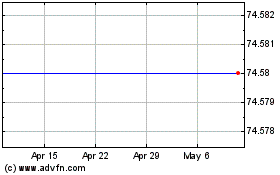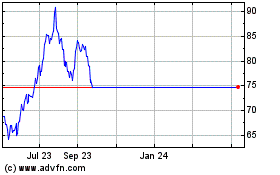By Eric Morath
The Biden administration blocked a Trump-era regulation that
would have made it easier for businesses to categorize gig workers
and others as independent contractors, and signaled it would take a
tougher enforcement stance against employers on worker
classification.
The Labor Department said Wednesday it is nullifying a rule it
completed in early January that sought to make it more difficult
for a gig worker, such as an Uber or DoorDash driver, and other
workers to be counted as an employee under federal law. Having
status as an employee, rather than a contractor, means those
workers are covered by federal minimum-wage and overtime laws.
Jessica Looman, principal deputy administrator for the Labor
Department's Wage and Hour Division, said the Trump rule would have
narrowed which workers were counted as employees across the
economy, not only gig workers, allowing more employees to be
classified as contractors.
"Misclassification of employees as independent contractors
presents one of the most serious problems facing workers today,"
she said on a call with reporters.
The department recently took action against a restaurant
classifying its dishwashers as contractors and found 70 home-health
aides who were misclassified as contractors, Ms. Looman added. She
said the department will look for opportunities to enforce existing
laws, especially as they apply to lower-wage workers.
Ms. Looman said Wednesday's announcement shouldn't dramatically
change how the department regulates app-based services but said the
department is engaging with those companies and others about
labor-law enforcement.
The Biden administration is "just going backwards with what
they've done and not helping resolve the misclassification problem
to the extent they think it is one," said Maury Baskin, co-chairman
of the law firm Littler Mendelson PC's Workplace Policy Institute
and an attorney who represents businesses. "They're just leaving
the situation in the chaotic state it's been."
Mr. Baskin is serving as counsel to business groups, including
the Associated Builders and Contractors, which in March filed a
federal lawsuit against the Labor Department challenging the Biden
administration's plan to delay and withdraw the earlier Trump
action.
Gig-economy companies were among the most vocal proponents of
the Trump-era rule, seeking to cement drivers and similar workers
as contractors after California's legislature passed a law
requiring the companies to reclassify their drivers as employees,
eligible for broad employment benefits.
In November, voters in California exempted Uber Technologies
Inc., Lyft Inc., DoorDash Inc. and others from the state law.
While the exemption allowed the companies to preserve their
business models in the most populous U.S. state, they did concede
some new benefits such as health insurance for drivers who worked
15 hours or more a week, occupational-accident insurance coverage
and 30 cents for every mile driven.
At the time, the companies said they would lobby to make this
model -- flexibility for drivers with limited benefits -- the
national standard.
Uber spokesman Noah Edwardsen on Wednesday said the company
views the current federal employment system as outdated. Workers
must choose to be an employee with more benefits and less
flexibility, or an independent contractor with more flexibility and
limited protections, the spokesman said.
"Uber believes that we can combine the best of both worlds by
offering independent work opportunities to the hundreds of
thousands of workers that use the Uber platform while also
providing these workers with meaningful benefits," he said.
In January, Uber said the Trump rule recognized the flexibility
gig workers sought. Trump administration officials said their rule
made it easier for Americans to be self-employed and set their own
hours.
Elizabeth Jarvis-Shean, vice president for communications and
policy at DoorDash, said its drivers on average work fewer than
four hours a week and value flexible schedules.
"We look forward to continuing to work with the Biden
administration and lawmakers across the political spectrum to help
develop a new portable, proportional, and flexible benefits
framework," she said in a statement.
Lyft spokeswoman Julie Wood said the company sees the regulatory
action as an "opportunity to refocus the conversation on what
drivers need and want, which is independence plus benefits."
The Labor Department acted this week to block the rule before it
was implemented Friday, following a common practice of presidents
of different parties undoing the prior president's pending rules
early in a new administration.
Nullifying the Trump rule maintains the decadeslong status quo,
which has largely allowed app-based services to not count drivers
and other providers as employees. The Labor Department at this time
isn't planning to offer new regulations for independent
contractors, Ms. Looman said on a Tuesday call.
By blocking the Trump rule, the Labor Department will continue
to use its previous regulation to enforce the Fair Labor Standards
Act, which was enacted in 1938. While Wednesday's action doesn't
immediately change how gig workers are classified, it leaves
ambiguity about how a Depression-era law will be applied to a
smartphone economy.
Labor Secretary Marty Walsh, in an April interview with The Wall
Street Journal, said that legitimate independent contractors are an
important part of our economy, but the Trump-era rule made it too
easy to deny workers employee status. Employees are also better
positioned than contractors to organize into labor unions. The
Biden administration has made creating union jobs a priority.
"We've seen employers are increasingly misclassifying their
workers as independent contractors in order to reduce labor costs
and take a lot of protections away from workers, including minimum
wage and overtime," Mr. Walsh said.
Amara Omeokwe contributed to this article.
Write to Eric Morath at eric.morath@wsj.com
(END) Dow Jones Newswires
May 05, 2021 17:24 ET (21:24 GMT)
Copyright (c) 2021 Dow Jones & Company, Inc.
DoorDash (NYSE:DASH)
Historical Stock Chart
From Apr 2024 to May 2024

DoorDash (NYSE:DASH)
Historical Stock Chart
From May 2023 to May 2024
